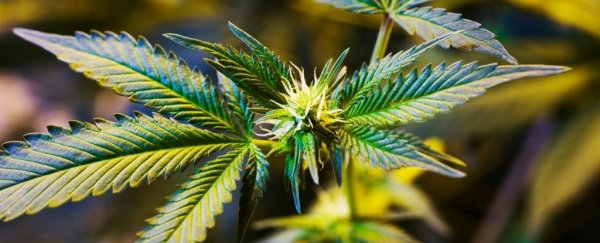The anti-seizure qualities of the cannabis plant can likely not be boiled down to a single compound, like cannabidiol (CBD), according to emerging research.
Studies in Australia have recently revealed numerous other compounds in the cannabis plant that also show anticonvulsant effects. Some of them could even be more powerful than CBD.
A small observational study in the United Kingdom now backs up those findings. When 10 children with intractable forms of epilepsy began using a medicine that contained the whole cannabis plant, including cannabidiols, terpenes, and flavonoids, their seizure frequency fell by an average of 86 percent.
The research was not randomized or placebo-controlled, however, these case studies show far greater success than the outcomes of CBD extracts alone.
Today, an oral extract of CBD, known as Epidyolex, is the only form of cannabis approved by the United States Federal Drug Agency (FDA) to treat severe seizures.
In placebo-controlled trials, however, Epidyolex doesn't seem to work for more than half of all children with Dravet syndrome, which is a rare, drug-resistant form of epilepsy. Where it does work, studies show about a 32 percent decline in seizure frequency.
That's a much lower rate of relief than what was found in children given medicine from the whole cannabis plant. While these initial findings will need to be supported by much larger sample sizes and in more controlled settings, they are extremely promising.
All 10 participants in the UK case series had previously not responded to CBD products.
"We are currently in [the] process of analyzing the respective components of each medication in this study which we plan to report on," the authors of the case series write.
The realization that cannabis could help treat seizures was first documented in Western science by an Irish physician working in India in 1843. Since then, the plant has become embroiled in a legal and political storm that has set back formal research by decades.
Scientists are desperately trying to catch up, as the plant, considered illicit in many places around the world, finally begins to enter the drug and supplement market. Yet historically, the focus of formal research has been limited.
Most of us have heard of both CBD and THC or tetrahydrocannabinol, which is the psychoactive part of the cannabis plant.
These two compounds are usually the only ones listed on different cannabis strains, and yet recent research suggests they aren't necessarily what gives the plant its medicinal qualities, or even its different 'highs'.
Instead, the combination of different cannabis compounds, some of which we have not even studied yet, could be far more important than any one substance on its own, despite what CBD marketing might try to sell you.
Flavonoids, for instance, are natural substances found in cannabis that are thought to bestow some anti-inflammatory and anti-carcinogenic properties when found in other medicinal plants. They also make molecules 30 times more effective at reducing pain and inflammation than aspirin.
Terpenes are another class of compounds in cannabis that are commonly overlooked. Recently, several of these compounds have been found to give cannabis its skunky smell.
The structure of these terpenes looks remarkably similar to those found in garlic, and in this particular plant, the compounds are thought to boost cardiovascular health and hold anti-carcinogenic properties.
Cannabis is a complex plant, containing over 400 chemical entities. To focus on just two cannabinoids gives us a very small piece of the overall puzzle.
To help find some of the other pieces, researchers in Australia are systematically testing each and every cannabis compound to see whether it reduces seizures in a mouse model of Dravet syndrome.
Then, they are going to try putting them back together, slowing mixing and matching different types and amounts, to see if they can settle on the Goldilocks mixture.
The ideal would be to find a way to treat epilepsy with the fewest side effects possible.
Even with Epidiolex that remains a problem. Clinical trials commonly report frequent negative events following administration of this CBD extract, including diarrhea, vomiting, fatigue, and abnormal results on liver-function tests.
Interestingly, there were no significant adverse events reported by the parents of any of the children treated with the whole cannabis plant in the UK.
What's more, all of the parents reported highly improved cognitive and behavioral outcomes, which the authors argue is probably a result of reduced seizure frequency and reduced use of other anti-epileptic drugs, which commonly come with negative side effects.
Given these impressive results, the authors of the case series are now calling upon the UK's National Health Service to include whole-plant medicinal cannabis in its prescribing guidelines for severe, treatment-resistant epilepsy.
Waiting for randomized, placebo-controlled trials could take a long time, since the conditions involved are rare, idiopathic and predominantly occur in children.
In the meantime, parents or the patients must continue to pay for private treatment, which can cost £2,000 per month (US$2,651).
"Such a move would be hugely beneficial to the families, who in addition to having the psychological distress of looking after their chronically ill children, have also to cover the crippling financial burden of their medication," the authors conclude.
The study was published in BMJ Paediatrics Open.
